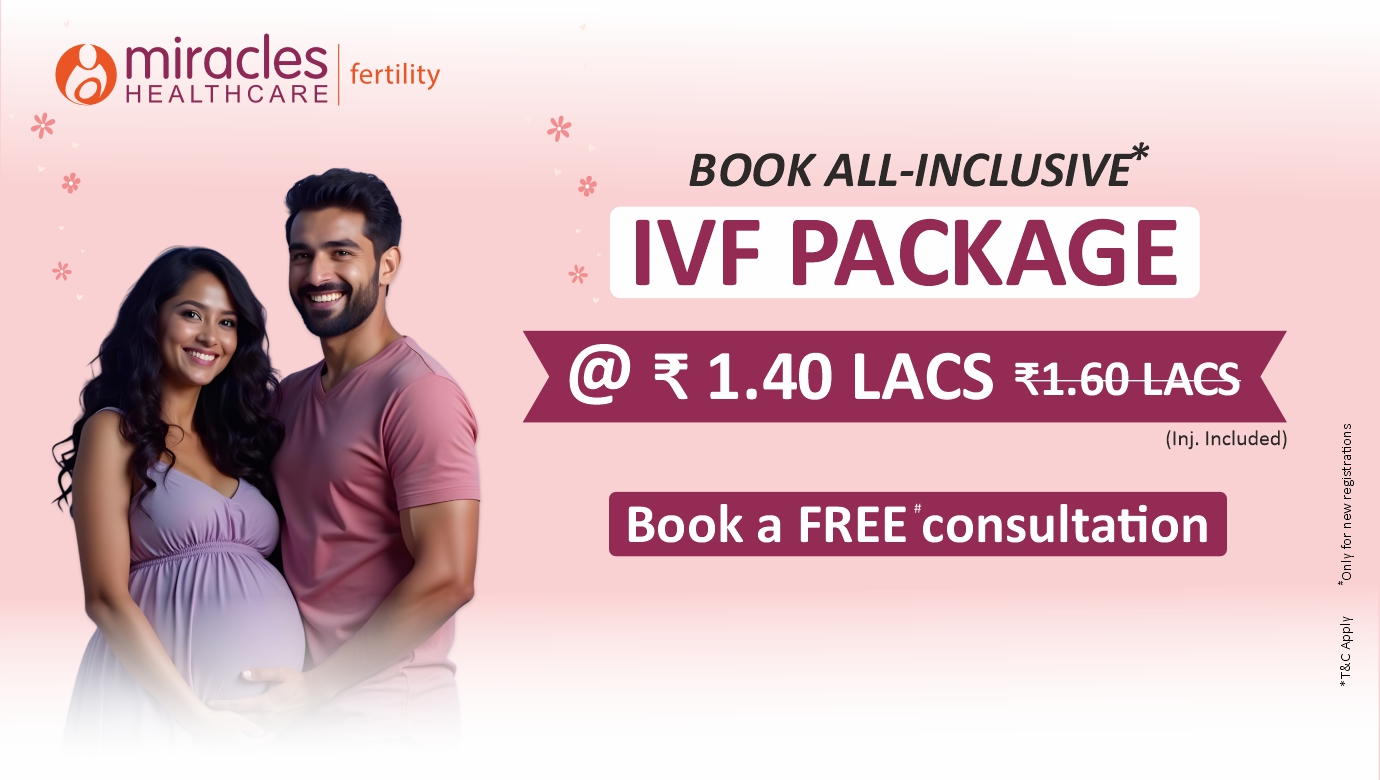Is IVF (In-Vitro Fertilization) Painful?
For couples struggling with infertility, IVF (in-vitro-fertilization) offers a ray of hope and the potential for parenthood. However, one common concern that arises among those considering IVF is whether the process is painful. It is completely normal to feel uncertain or anxious about the procedure, especially if it's your first time going through it. In this blog post, the leading IVF specialist in gurgaon at Miracles Fertility & IVF Clinic provides in-depth information about the IVF process and addresses the important question: "Is IVF painful?"
Understanding the IVF Process:
IVF is a complex and multi-step procedure designed to assist with conception when natural methods are not successful. The process generally involves several stages, such as stimulating the ovaries, retrieving eggs, fertilizing the eggs in a lab, and transferring the embryo into the uterus. Each step of the IVF treatment journey comes with its own set of experiences, and the level of discomfort can vary from person to person. Factors like pain tolerance, the specific medical circumstances of the patient, and the expertise of the medical team can all influence how the process is felt physically.
Is IVF Painful?
The short answer is No. IVF is generally not painful. However, some stages of the procedure may cause mild discomfort, but this is usually manageable. Here is a brief of each stage of the IVF process along with what you can expect.
1. Ovarian Stimulation: This is the very first step of IVF, and involves using hormonal medications to stimulate your ovaries. The goal is to produce multiple eggs instead of the single egg that is released during a normal menstrual cycle. This is a crucial phase in IVF because more eggs mean more chances for successful fertilization.
What to Expect: While this phase is not generally painful, some women experience mild discomfort such as bloating, cramping, or tenderness in the abdominal area due to the ovaries becoming enlarged. Additionally, you will likely need to undergo regular ultrasounds and blood tests to monitor the development of follicles (egg sacs) and ensure that hormone levels are on track.
Tips for Comfort:
-
Drink plenty of water to stay hydrated.
-
Engage in light physical activities like walking to reduce bloating and discomfort.
2. Monitoring Through Ultrasounds and Blood Tests: During ovarian stimulation, you will have frequent visits to your fertility clinic for ultrasounds and blood tests. These tests help monitor your hormone levels and the growth of the eggs in the ovaries.
What to Expect: The transvaginal ultrasound, where a probe is inserted into the vagina to get a close view of your ovaries, may cause some mild discomfort, especially if you have a sensitive pelvic area. However, the procedure is relatively quick and is usually not painful. Blood tests are typically fast and cause minimal discomfort.
3. Egg Retrieval: Once your eggs are fully developed, they are ready to be retrieved. This is a minor procedure that involves using a thin needle to collect the eggs from your ovaries. This is done while you are under sedation or light anesthesia, so you won’t feel any pain during the procedure itself.
What to Expect: After egg retrieval, it is common to experience mild cramping or spotting for a day or two. This is usually short-lived and can be managed with rest and mild pain relievers prescribed by your doctor.
Tips for Comfort:
-
Take it easy on the day of the IVF procedure.
-
Avoid heavy lifting or strenuous activities post-retrieval to help recovery.
4. Fertilization: Once the eggs are retrieved from ovaries, they are fertilized with sperm in a laboratory setting. During this step, there is no physical involvement from the patient, so it is entirely pain-free.
5. Embryo Transfer: The final step in the IVF process is the transfer of the embryo(s) into your uterus. This is normally done 3-5 days after fertilization. The transfer is a quick and minimally invasive procedure that uses a thin catheter to insert the embryo into the uterus.
What to Expect: Many women report that embryo transfer feels similar to a Pap smear, and it is typically painless. However, some women may feel slight discomfort or cramping during or after the procedure. These sensations are usually mild and temporary.
Tips for Comfort:
-
Practice different relaxation techniques such as deep breathing before and during the IVF treatment procedure.
-
Take a moment to rest after the transfer to help you feel more at ease.
Common Side Effects of IVF
While IVF treatment is generally well-tolerated, some side effects can cause discomfort. Below are a few potential side effects:
-
Ovarian Hyperstimulation Syndrome (OHSS): In rare cases, the ovaries may become swollen and painful due to ovarian stimulation. This health condition can cause intense bloating, nausea, and abdominal pain.
-
Emotional Stress: The emotional toll of IVF can sometimes make you more sensitive to discomfort. The stress, anxiety, and hormonal changes may amplify minor aches and pains.
-
Spotting or Cramping: Mild cramping or light spotting can occur after egg retrieval or embryo transfer. This is normal and temporary, but should still be discussed with your doctor if it feels unusual.
Always consult with your fertility specialist about any symptoms that feel abnormal or intense.
Does Everyone Experience the Same Level of Pain?
The experience of pain or discomfort during IVF is highly individual. Many factors contribute to how a person perceives pain, such as:
-
Pain Tolerance: Individuals with a higher pain threshold may experience less discomfort during IVF procedures.
-
Underlying Health Conditions: Conditions like endometriosis, fibroids, or pelvic inflammatory disease can make the reproductive organs more sensitive, potentially intensifying discomfort.
-
Anxiety Levels: Fear of pain can sometimes heighten your sensitivity to discomfort. Staying informed about each stage of the process and using relaxation techniques can help manage this.
-
Medical Expertise: The skill of the medical team matters greatly. Choosing a reputable clinic with experienced IVF specialists can ensure smoother procedures with less discomfort.
Pain Management During IVF
To help manage any discomfort that may arise during IVF, modern fertility treatments focus on patient comfort. Some common ways to manage pain during the process include:
1. Medications: Your doctor may prescribe pain medications or muscle relaxants to manage discomfort, particularly during egg retrieval or after embryo transfer.
2. Lifestyle Adjustments:
-
Stay hydrated and eat a well-balanced diet.
-
Avoid strenuous activities during ovarian stimulation and post-egg retrieval.
3. Mind-Body Relaxation: Practices like yoga, meditation, and acupuncture may help reduce stress and alleviate discomfort during IVF.
4. Support System: Having a partner, friend, or family member with you during appointments can provide both emotional and physical support.
Myths About IVF Pain
There are many misconceptions surrounding IVF pain, often making the process seem more daunting than it is. Here are a few myths debunked:
-
Myth 1: IVF is Extremely Painful
-
Fact: Most stages of IVF cause mild discomfort at most, and thanks to advances in medical techniques, the process is now much more patient-friendly.
-
Myth 2: Anesthesia Doesn’t Work During Egg Retrieval
-
Fact: Sedation during egg retrieval is highly effective, and most women report feeling no pain during the procedure.
-
Myth 3: The Entire IVF Process is Unbearable
-
Fact: While IVF involves some mild discomfort at certain stages, it is generally manageable, especially with the proper care, support, and pain management strategies.
Conclusion:
While IVF involves multiple steps that may cause mild discomfort, the pain is generally minimal and temporary. The joy of holding your baby in your arms makes it all worthwhile. With modern medical advancements and experienced professionals, the process has become more patient-friendly than ever. If you are considering IVF, visit Miracles Healthcare and consult IVF specialists near you. Our team of IVF doctors is here to help. Book your consultation today and take the first step toward making your dream of parenthood a reality.



_Painful.webp)





.webp)





Was the information useful?
0 0